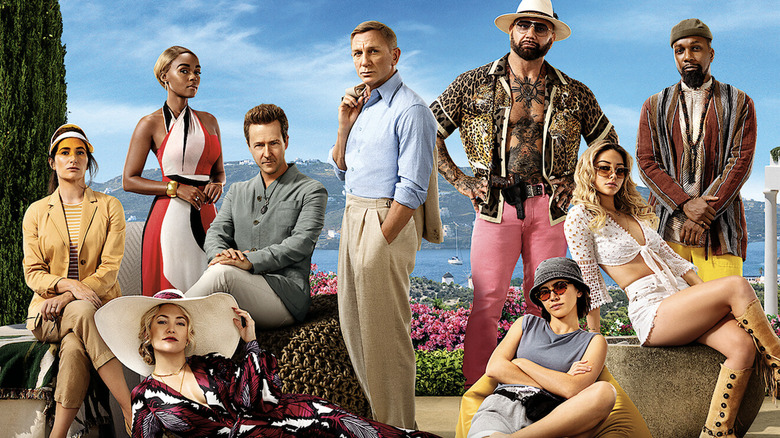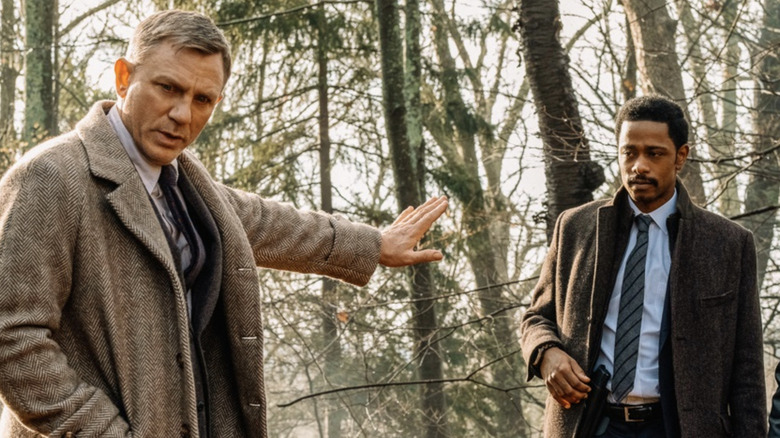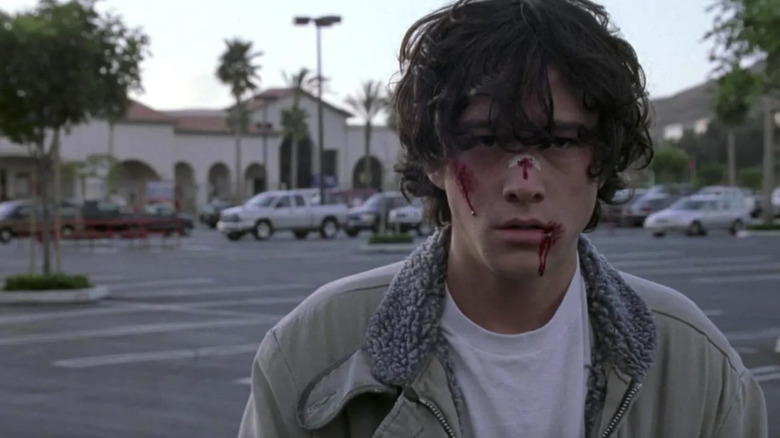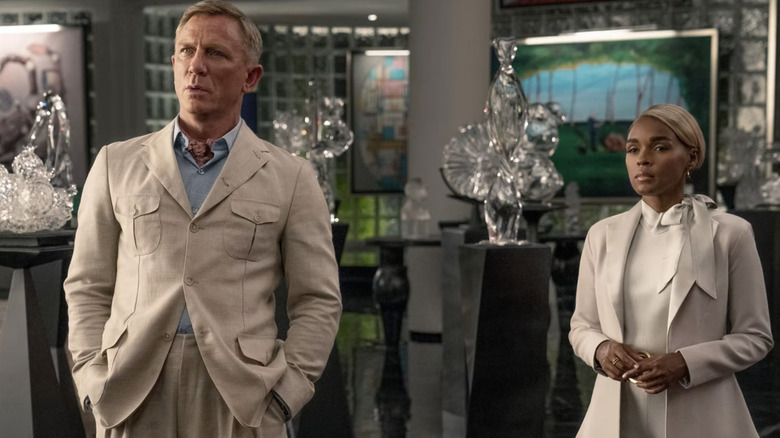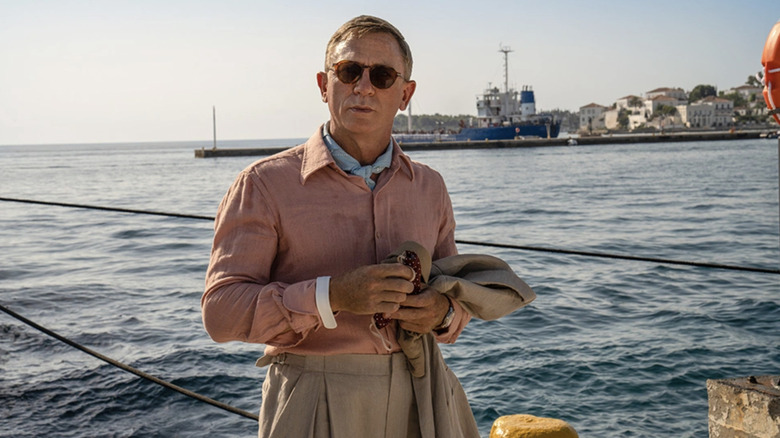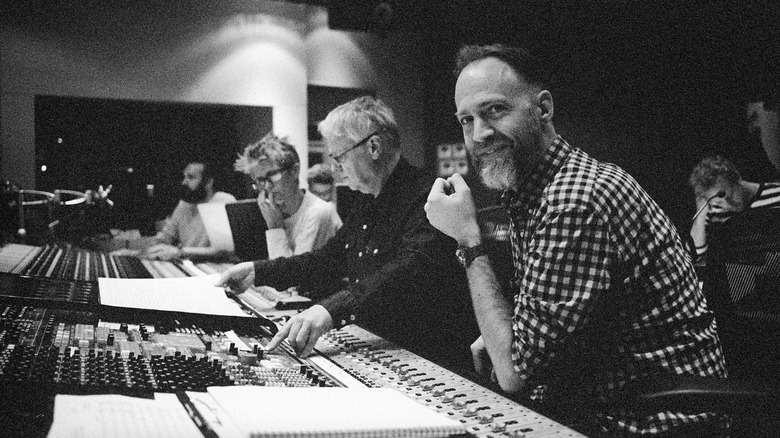Glass Onion Composer Nathan Johnson On Making The Knives Out Sequel's Score 'A Lot Bigger' [Exclusive Interview]
With the exception of "Star Wars: The Last Jedi," every Rian Johnson film released thus far has been scored by composer Nathan Johnson. As cousins, the two have collaborated on movies since they were children, giving Rian's films an extra personal touch. From the found instrument-fueled sounds on their first feature-length collaboration, "Brick," to the futuristic noir score for "Looper," Nathan Johnson has helped to make the director's films even more distinct than they already are. The composer got a chance to work with an orchestra for the first time when creating the score for Rian's 2019 whodunnit "Knives Out," and the result was a movie that had the most classical feel of any of their collaborations. Aside from Rian's movies, Nathan has also worked on films like Guillermo del Toro's "Nightmare Alley" and video games like "inFamous: Second Son."
Nathan has teamed up with Rian once again for a follow-up to "Knives Out," titled "Glass Onion," and given the "A Knives Out Mystery" subtitle by Netflix. However, don't let that subtitle fool you: "Glass Onion" may feature the return of Daniel Craig as Benoit Blanc, but the film feels significantly different than "Knives Out." I had the chance to sit down with Nathan Johnson over Zoom and talk about how extra "Glass Onion" is from "Knives Out" (both musically and thematically), as well as the talented composer's body of work and what he has found most rewarding from those past experiences.
This interview has been lightly edited for clarity and brevity.
'You hear Blanc's theme come back, but it's an entirely new score'
You've been making movies with Rian Johnson since you were both children. I wanted to ask how the creative process between you two has evolved over all of these films.
Yeah. I mean, for "Brick," we started — that was Rian's first film, and he edited the whole thing in his bedroom on Final Cut Pro. And I made the entire score in my bedroom with a single microphone and a PowerBook. So obviously, the tools have gotten quite a bit bigger. But yeah, it's that same thread, which is he writes something, sends it to me, and I flip out. It feels like Christmas morning anytime he sends me a script, and I get to dive into the next world he's created.
The score for "Glass Onion" has this delicate balance of familiar and new, evoking the same feelings as the "Knives Out" score while still being very much its own thing. Did you approach scoring this film as a follow-up to "Knives Out" or as its own separate thing?
We thought about it as its own separate thing. That was one of the things I was blown away by when Rian sent me the script. It is in the same world and Benoit Blanc's back, but it doesn't feel like a sequel. Even structurally, it's totally different. Obviously, we have a whole new cast and a whole new location. But the stuff underpinning it at the very bottom is brand new. So we approach the score in the same way.
So you hear Blanc's theme come back, but it's an entirely new score. And I wrote a new string quartet for this one. That first string quartet set the rules for the sandbox we were playing in. But this one, we made it a lot bigger. We're recording with the 70-piece orchestra. But at the same time, we still want it to feel very precise. The way that these movies work it's like a Swiss watch. Everything is interlocking together. And we never wanted the music to feel just a blurry wash of sound. It's all very, very precise, even when we're playing with a giant orchestra.
It felt like there was no wasted space in the movie. So that goes for the music as well, right?
Yeah, definitely. Everything is very much there for a purpose.
'You don't want an undefined canvas'
Your last project was "Nightmare Alley," where you worked with Guillermo del Toro. What experiences did you take from that noir thriller into your composition/scoring process for "Glass Onion?"
I mean, [del Toro] would come over to my studio every week. It was just such an amazing process, and he is such an empathetic filmmaker and so smart. So yeah, just every day getting to sit with him was little wisdom bombs that he would drop. But yeah, in terms of the films, they're very different films and very different scores. "Nightmare Alley" did a specific thing where one character at the center didn't change, and the score was about underlying that refusal to change.
Whereas "Glass Onion," the whole movie is about change, and it's not only in individual characters, but seeing things from different perspectives. So yeah, in my mind, they feel about as different stylistically as they could be.
"Brick" is one of my all-time favorite films, and a big part of it has to do with the score and the unconventional methods you used to compose it. What did you find most rewarding when making the score for that film?
Well, thank you, first of all. I mean, "Brick," I feel like, at one level, I had no idea what I was doing and didn't know what I didn't know. As I said, we are making the whole thing in our bedrooms. There was a very low budget. But I think that one of the things about any kind of art making I love is this idea of restrictions. When you're growing up, you think, "Oh, if I had all the unlimited resources, just wait until you see what I can do."
But restrictions are ... as we know, as anyone knows who does this, whether it's writing for a deadline or coming up with something with limited resources, or restricting the instrumentation you're going to use, all of those things act as a way to constrain the canvas that you're working on, essentially. You don't want an undefined canvas.
So with "Brick," that meant we were playing tune wine glasses instead of using a string section or hammering on filing cabinets in the hallway instead of tympany drums. And I remember when Rian got to the dub stage, they said, "Wow, it sounds like there were real instruments in this." And we didn't even know, but in low-budget movies, most of the scores at that time were just being made with samples.
But it felt rewarding to use what is at hand, and that's something I always talk to young artists when they're starting about is, don't wait until you think, "I need this before I can make my masterpiece." Just start now. And that is the thing that draws people to your work. And then maybe next time they say, "Okay, do this, but on a bit of a bigger stage."
'I get to just dance in the realm of subtext'
How did you find the emotional balance in the musical score for a film like "Glass Onion," which is thrilling in one scene, hilarious in another, and tragic in the next?
Well, it's something that we thought about a lot. Early on, as an overarching thing, Rian said, "We want to lean into the fun of this." He talks about not making these as a crossword puzzle you're trying to solve but as a rollercoaster ride — that you're being taken on this fun journey. And obviously, the setup is a bunch of people in lockdown, and they get to go to this fabulous Grecian island. And so, at one level, we're leaning into this opulent, lush, fun, big sound. But then, of course, it's a mystery. So that tension needs to be there.
But something that many people don't think about, and something that I was very tuned into, is that it's not just that seesaw of fun or mystery. Also, we must care about the characters. So a deep emotion, specifically in Andi's theme, underpins the whole movie. If at the heart of it, if we don't care about the characters, if we don't care when something bad happens to them, we view the movie at a distance, and it's important. My starting point is often: "What is the doorway into the emotional connection?"
In "Glass Onion," was there a particular actor whose performance you found most rewarding to score?
I mean, just starting with talking about Andi's theme, Janelle Monáe's performance blew me away. And I would get the luxurious opportunity with Rian's movies to be there on set and to watch the performances go down. And at that point, I was blown away by what Janelle was doing. But then, when I saw the whole movie cut together, it hit you on a new level. So that is a virtuoso performance. But Daniel's character is amazing and seeing him bring that back and peel back new layers ... Kate Hudson is so much fun with what she's doing. Kathryn [Hahn], as well. Yeah, I can just go down the list.
That's the amazing thing about these movies, is they're these film actors that we've grown up loving, or in some cases, they're new and fresh, and we haven't seen a lot of what they've done, but they're all operating on the highest level. As a composer, you can't ask for more than that. The worst thing you're tasked to do as a composer is fix something going on. And with this, there's no fixing. I'm not trying to help out with a performance. I'm getting to trust that what they're bringing is amazing, and then I get to just dance in the realm of subtext.
'He's like the audience's eyes into the film'
Benoit Blanc grows a little bit more as a character in "Glass Onion." Did you change or evolve his leitmotif for this film, or discover anything new about the character you wanted to incorporate into the score for this film?
Yeah. Well, it's something that Rian and I have talked about, and the trick with these movies is that the detective character is not the main character. In a way, he's like the audience's eyes into the film, but there are other protagonists. So Blanc has a couple of themes. He's got his hunting motif, and his central motif. What's really fun is weaving those in with the other characters' other motifs.
Scoring a film in a melodic motif way, that's something that has almost fallen out of vogue in the last 10 to 20 years. But it's the way that these composers that Rian and I grew up loving, it's the way they did it. And thank God that Rian is up for melodic scores, because I look up to those composers so much, Nino Rota, obviously, John Williams, but Morricone. These composers are writing themes to work with the characters.
It's my favorite way to enter a movie. We've got all these different characters. We've got the Miles Bron character, we've got the Andi character, we've got all the disruptors, and then we've got Blanc. How do Blanc's motifs weave in with those? How can we invert those? Again, like we were talking about earlier, it defines the canvas we're getting to work with.
The importance of collaboration
What do you find most different about scoring a video game compared to scoring a film?
Well, at least with my experience scoring a video game, you're writing music, not pictures. So it's creating music in the idea of the world. And then the amazing game engineers build this engine that plays the music, and you're writing on different levels so that when the action comes up, depending on how a player is going to play the game, the music can add a layer of excitement.
Whereas for film, primarily when I work with Rian, it is scored to the scene throughout the movie. And I may write motifs ahead of time based on the characters, but we do these the old-fashioned way, where we sit down and score it to every beat. And that means I'm throwing away tempos, which you can't do very easily in a video game. The video game needs to be on the grid. But I love that idea of a breathing orchestra, so I'm always writing things off-grid, where we can stretch out and then ramp up. I love that idea of custom tailoring it to the scene.
How important is collaboration to you on a film like "Glass Onion" or "Knives Out" when making the score for those films?
Yes. Yeah, it's the key thing for me. And I love that you raise this question because I'm very much of the mindset that my job when I'm scoring a movie is to get inside the director's head and figure out how I help them tell their story. Everything else is secondary to that. You hope it's exciting music that will tickle your brain, but all of it is serving the story.
And the director, especially a director like Rian, who has also written the story, they are at the point of that pyramid. If all of us are trying to serve this story, it hopefully becomes an egoless task, including the director. Because what that means, if everything is aligned, is that the director is not the cruel god at the top of it, but the director is also serving the ultimate pinnacle: How do we tell the story in the best way possible?
"Glass Onion: A Knives Out Mystery" is now streaming on Netflix.
